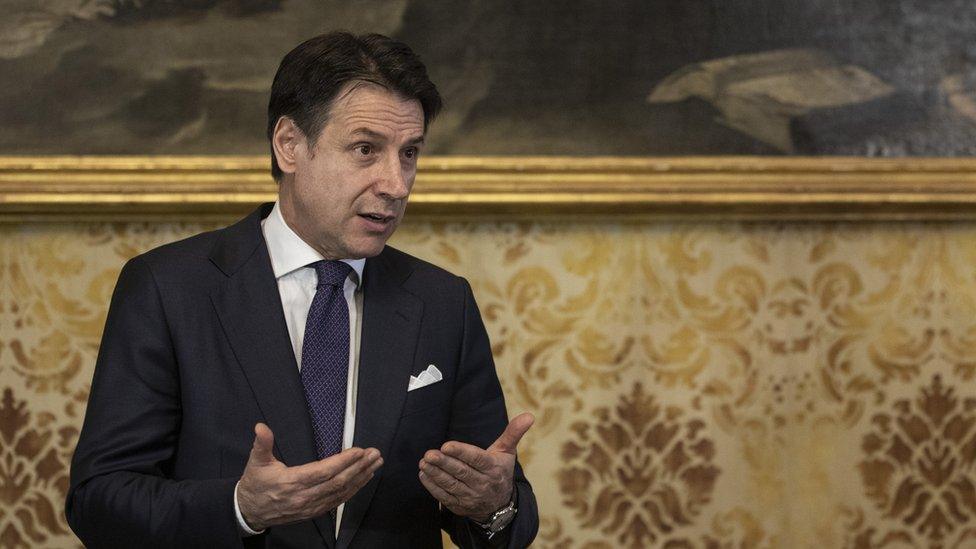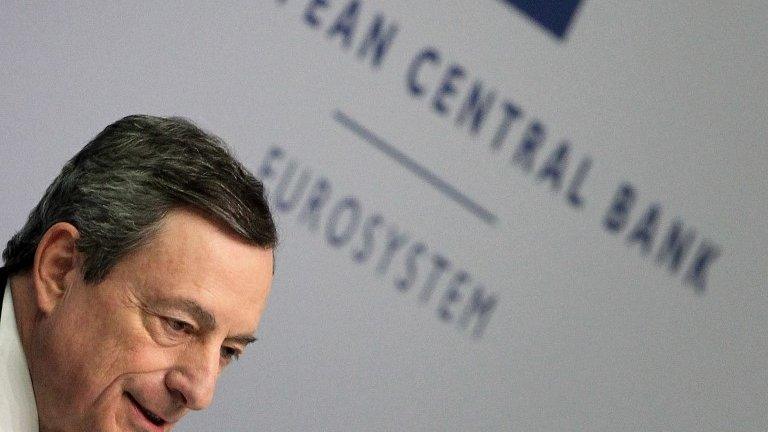Italy in recession amid sluggish eurozone
- Published

The economy is a problem for Italian Prime Minister Giuseppe Conte
Italy's economy tipped into recession at the end of last year, according to latest figures.
In the final three months of 2018, the economy shrank by 0.2%, following a 0.1% decline in the third quarter, the Istat statistics office said.
Italian Prime Minister Giuseppe Conte said the contraction was likely to continue into 2019.
Meanwhile, figures from the EU showed economic growth in the 19-country eurozone still languishing.
Growth in the euro area remained at 0.2% in the final quarter of 2018, the same as the previous quarter and in line with analysts' expectations.
The figures, issued by the Eurostat agency, external, showed that in the 28-nation EU as a whole, fourth-quarter growth was 0.3%.

In contrast to Italy, some other eurozone economies expanded more than expected, with France and Spain posting growth rates of 0.3% and 0.7% quarter-on-quarter respectively.
Italy's statistics office said agriculture, forestry, fishing and industry had all contributed to the economic downturn, while a rise in net exports failed to offset those declines.
Italy's coalition government was forced to revise its expansionary 2019 budget last month after the European Commission raised concerns about the impact on the country's debt levels.

Analysis by Andrew Walker, BBC World Service Economics Correspondent

The renewed recession in Italy aggravates the problem the government has with its finances.
The ruling parties' desire to increase spending to meet election campaign commitments led to a stand-off with the European Commission which argued Italy was going to be borrowing too much. Rome pared back its plans and the dispute was resolved.
But the fact that the economy has turned out to be even weaker is bad news for the government finances.
Tax revenue will be hit and that will tend to lead to a bigger financial hole to be filled by borrowing.
Italy's problem is its accumulated debt, which is on one measure the largest in the eurozone.
It would be a huge problem for the rest of the eurozone if Italy were to suffer the kind of debt crisis that Greece and others experienced a few years ago.
That is not a near-term prospect, but Italy's persistently weak economic performance makes it very hard to banish that risk conclusively.

Italy has the biggest government debt in the EU at more than €2.3 trillion ($2.6tn; £2tn). It is also the fourth-largest government debt in the world.
The country's debt burden as a percentage of annual economic activity is second only to Greece in the EU at 132%.
Last week, European Central Bank (ECB) president Mario Draghi said eurozone economic data had been weaker than expected and the risks to growth had increased.
Claus Vistesen, chief eurozone economist at Pantheon Macroeconomics, said that the overall eurozone figures "don't look pretty, but have been well telegraphed by the hard data and the financial market horror show in Q4".
"Indeed, it seems to us that markets will be inclined to look at these headline [figures] as good news. They indicate that things probably won't get much worse in the near term - this is a bold assumption, given poor January survey data - and that the ECB will keep rates low for a long time."
- Published24 January 2019

- Published5 October 2018
